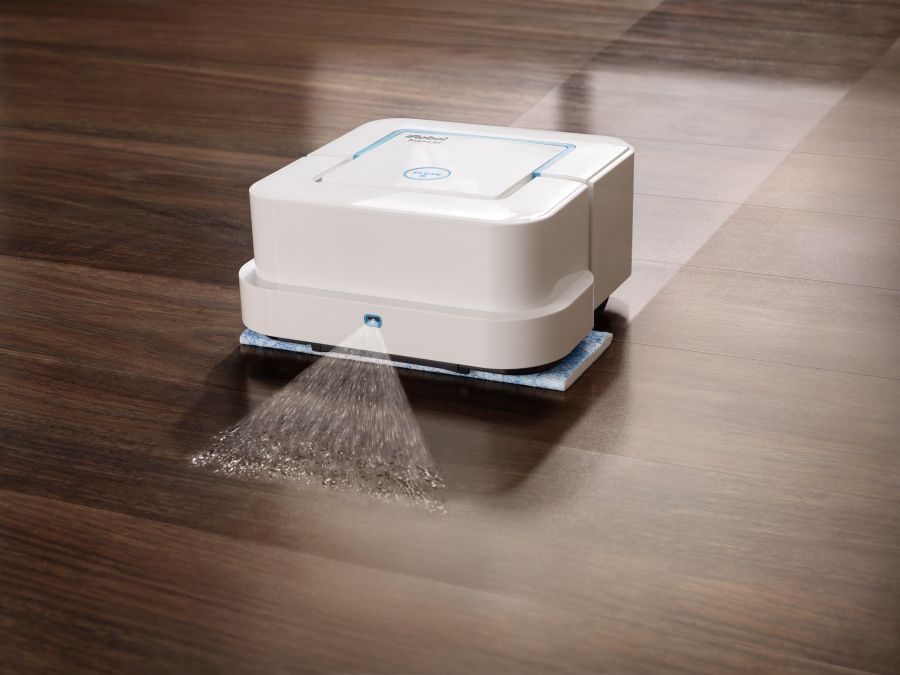
Robohub.org
iRobot’s $199 floor mopper designed for Chinese markets

iRobot Braava jet 240. Source: irobot.com
iRobot has been streamlining its operations to focus on consumer products and enhancing shareholder value. Recent moves to divest their defense division, launch a low-cost Braava Jet floor cleaner, and investing in 6 River Systems all attest to their strategy.
Divested defense division
In a February transaction valued at $45 million, iRobot sold its Defense and Security division to Arlington Capital Partners. The divestiture ends iRobot’s dual focus on the military and consumer markets and ends a multi-year revenue slide in the defense division. The sale was a strategically planned transition as the Iraq and Afghanistan wars wound down.
Colin Angle, iRobot Chairman and CEO, said: “In the spring of 2014, we engaged Blackstone Advisory Partners LP, now known as PJT Partners, to review strategic alternatives for our Defense and Security business. After a thorough and deliberate process, we’ve concluded the sale of the business to Arlington Capital Partners will maximize shareholder value by allowing us to focus on our much larger Home segment.”
Launched new low-priced floor cleaner
Earlier this month iRobot launched the Braava Jet Mopping Robot to add to their wet floor care business and to generate a new revenue stream beyond the Roomba line of vacuum products. The new robot is small — about 6″ square and 3″ high — with a nifty carrying handle — and focused on cleaning hardwood floors and tight spaces by dry mopping, damp mopping (uses 60% of water compared to wet mode), and wet mopping. Each mode has a unique pad easily snapped onto the bottom of the robot (and snapped off over the trash bin) and identified by the robot as to which of the three functions it is to perform. The new little robot’s best feature, however, is its low price: $199.
The Braava Jet is to be marketed heavily in China where the more expensive previous version of the Braava floor cleaner did quite well in year-over-year sales. In fact, according to CEO Colin Angle in an analysts financial call, said that growth in China was more than 70% year over year in 2015, driven primarily by the successful adoption of previous Braava models given predominately hard floor surfaces in the region. Hence the new lower-priced device is expected to be ideal in both the China and American markets.
Increasing shareholder value
In a recent letter to shareholders iRobot described its shift in focus toward the high-growth home robot business and by investing in projects that show the greatest promise for outsized returns.
iRobot is doing that with its existing and new products but also through its venture arm, iRobot Ventures, which just invested in 6 River Systems, a Boston-based startup of ex-Kiva executives developing fulfillment automation for e-commerce and retail operations. iRobot Ventures previously invested in Petnet, a smart feeder for cats and dogs, and Paracosm, a 3D vision and mapping technology company.
As an aside, Red Mountain Capital Partners, a VC which owns 6.1% of iRobot shares, and that invests in undervalued small cap companies and attempts to enhance and realize shareholder value through active ownership, is attempting to add two board members to the iRobot board at the upcoming stockholders meeting.
“Throughout our nearly year-long engagement with iRobot, it has become clear that the Board will only take action in reaction to significant shareholder pressure. As such, we have nominated individuals who are highly qualified and would bring a much needed shareholder voice to the boardroom. Red Mountain has consistently called for improved Board oversight with respect to the Company’s allocation of capital, cost management, return on invested capital and corporate governance policies,” said Willem Mesdag, Managing Partner of Red Mountain.
In the letter to shareholders, iRobot does not recommend these two board members but another two of it’s picking while citing that iRobot has delivered total shareholder return of 66% over the past three years compared to 59% for peers and 50% for S&P 500 companies.
tags: c-Business-Finance, cx-Consumer-Household, iRobot



